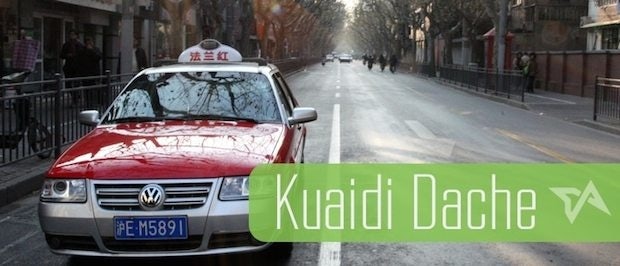
Despite the looming threat of government regulation, China’s most popular taxi-hailing mobile apps, Didi Dache (Chinese: 滴滴打车) and Kuaidi Dache (Chinese: 快的打车), have recently been avidly seeking partnerships with businesses ranging from online travel agents to premier roast duck restaurants as they sharpen their knives to face a new round of rivalry on the road.
Launched in September 2012, Didi Dache was created by a Beijing startup Xiaoju Technology (Chinese: 小桔) and funded by the tech giant Tencent (Chinese: 騰訊). The most recent data revealed in April 2014 showed that it now books more than 5 million rides a day and covers about 198 Chinese cities. Kuaidi Dache, on the other hand, was created by Hangzhou startup Kuaizhi Technology (Chinese: 快智) in August 2012, and later received funding from Matrix Partners. Its official data shows that Kuaidi Dache now has an average daily booking of more than 6.2 million rides and covers 268 cities in China, including Hong Kong and Lhasa.

On June 26, an article on iFeng.com by the Guangzhou Bieyang app development company (Chinese: 别样) reported on Didi’s and Kuaidi’s proactive approaches to collaboration with business partners, and analyzed the two apps’ future outlook in the face of ongoing government regulation, which includes a recent Ministry of Transport proposal that the apps be integrated.
After their first-round efforts, Didi Dache and Kuaidi Dache have basically gained a firm foothold in the taxi-hailing app market. The next round of competition will be focused on their business models; namely, how they decide to collaborate with their respective partners is crucial as app commercialization begins.
Kuaidi recently partnered with the famous Quanjude (Chinese: 全聚德) roast duck restaurant’s Wangfujing location to create a travel reimbursement program which takes care of part of the taxi fare for dining guests who use the app and features a rewards program which allows guests to accumulate points and redeem them for free desserts. In addition to the restaurant, Kuaidi is also collaborating with the domestic travel agency eLong (Chinese: 艺龙) and will be soon launching a hotel search engine that offers lodging booking services and Kuaidi taxi coupons.
Not to be outdone by Kuaidi, Didi takes advantage of its affiliated social platform WeChat, and allows users to deduct taxi fares with the amount they win from the social app’s massively popular Red Envelope game. As the FIFA World Cup craze began to heat up, Didi also partnered with the China’s lottery website 500.com for a discounted sports lottery program. According to iFeng’s analysis:
While some are optimistic about the collaboration models and consider them as an effective way of maintaining users’ viscosity, others believe such a marketing strategy is not uncommon and could only work for a limited period of time under certain conditions, and might be ineffective to generate large revenue.
The two apps, however, are optimistic as they both revealed monthly revenue of more than 10 million yuan earlier this year. In addition, both companies have business expansion plans: Didi is targeting the carpool and car rental markets, whereas Kuaidi and its subsidiary Dahuangfeng (Chinese: 大黄蜂; English: “Hornet”) have their eye on the business car rental market. The article states that the road ahead is challenging, however:
Impeded by political reasons, the business expansion progress is slow. Their commercialization currently remains at a low level of joint marketing, and their revenue basically has no direct correlation with the app’s functionality. In the online business battlefield where coupons and discounts are common, it is unknown that whether these models can continue to attract users in the long run.
Guangzhou’s Bieyang app development company sees these taxi-hailing apps as merely a travel tool, and believes they should make smart collaboration choices with related businesses such as travel agencies rather than consumer product companies such as apparel to create staying power. Bieyang advises that taxi apps should focus on transforming themselves from a “travel tool” into a “travel portal,” adding other travel services based on different locations and time for a more successful outcome.